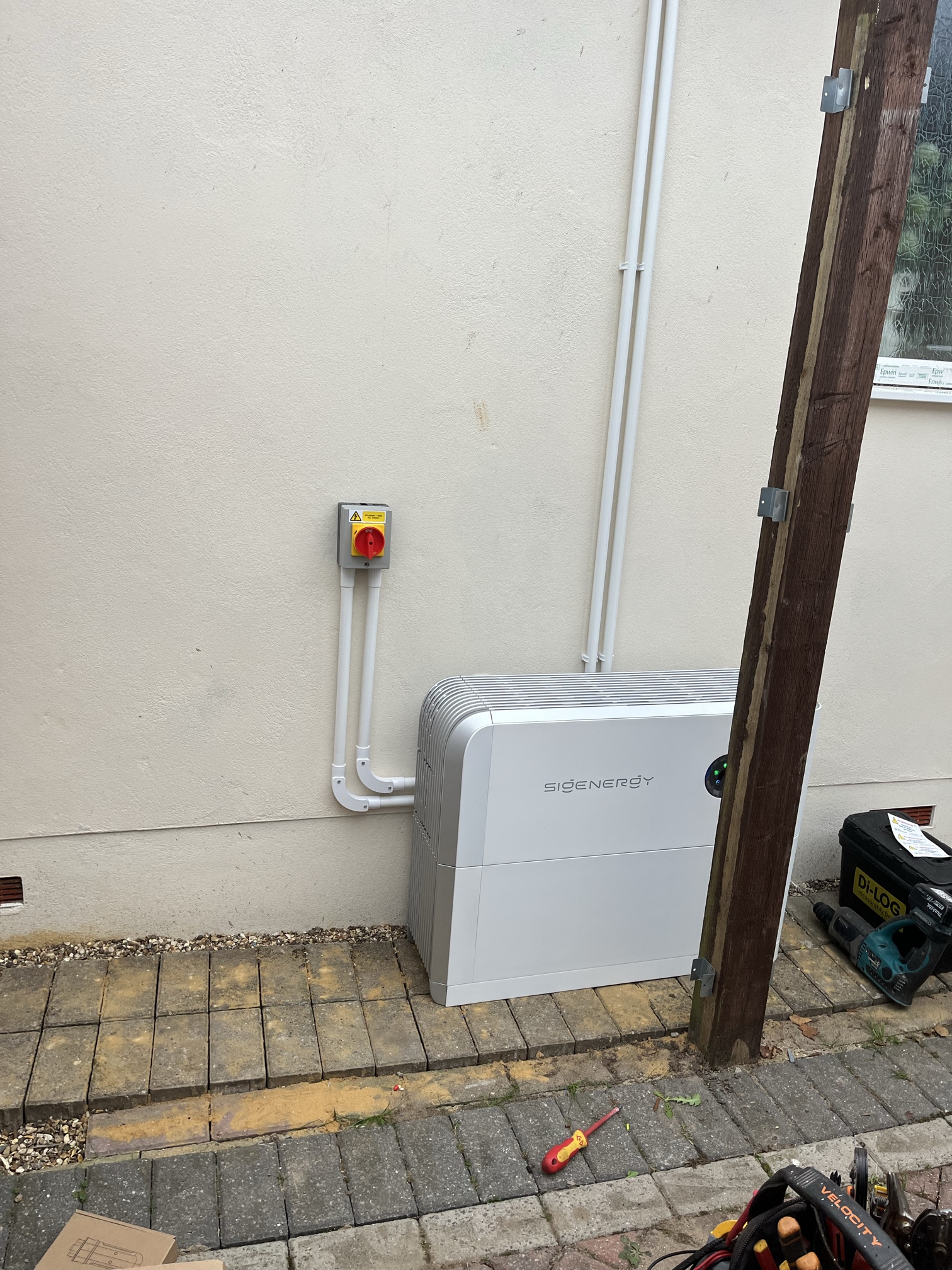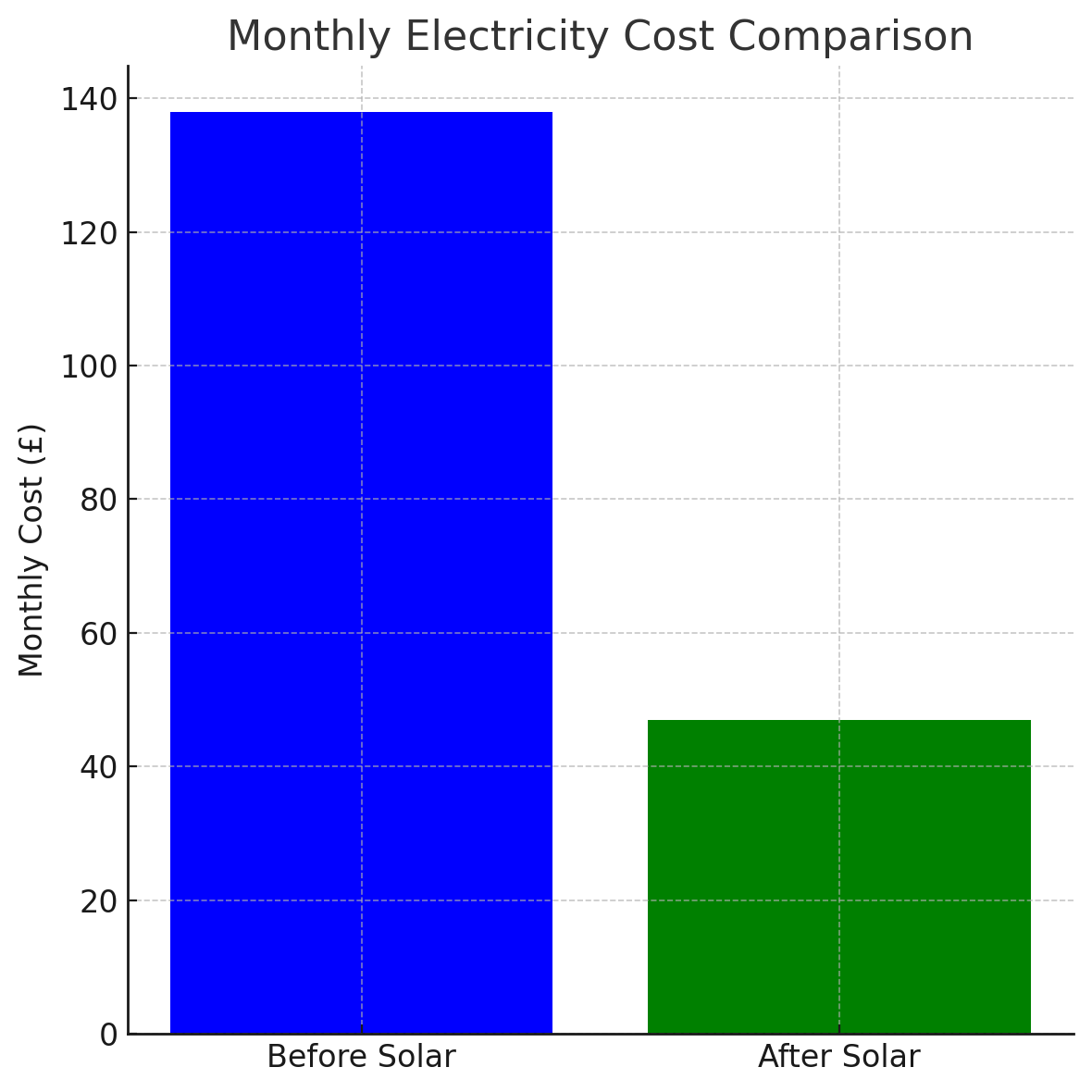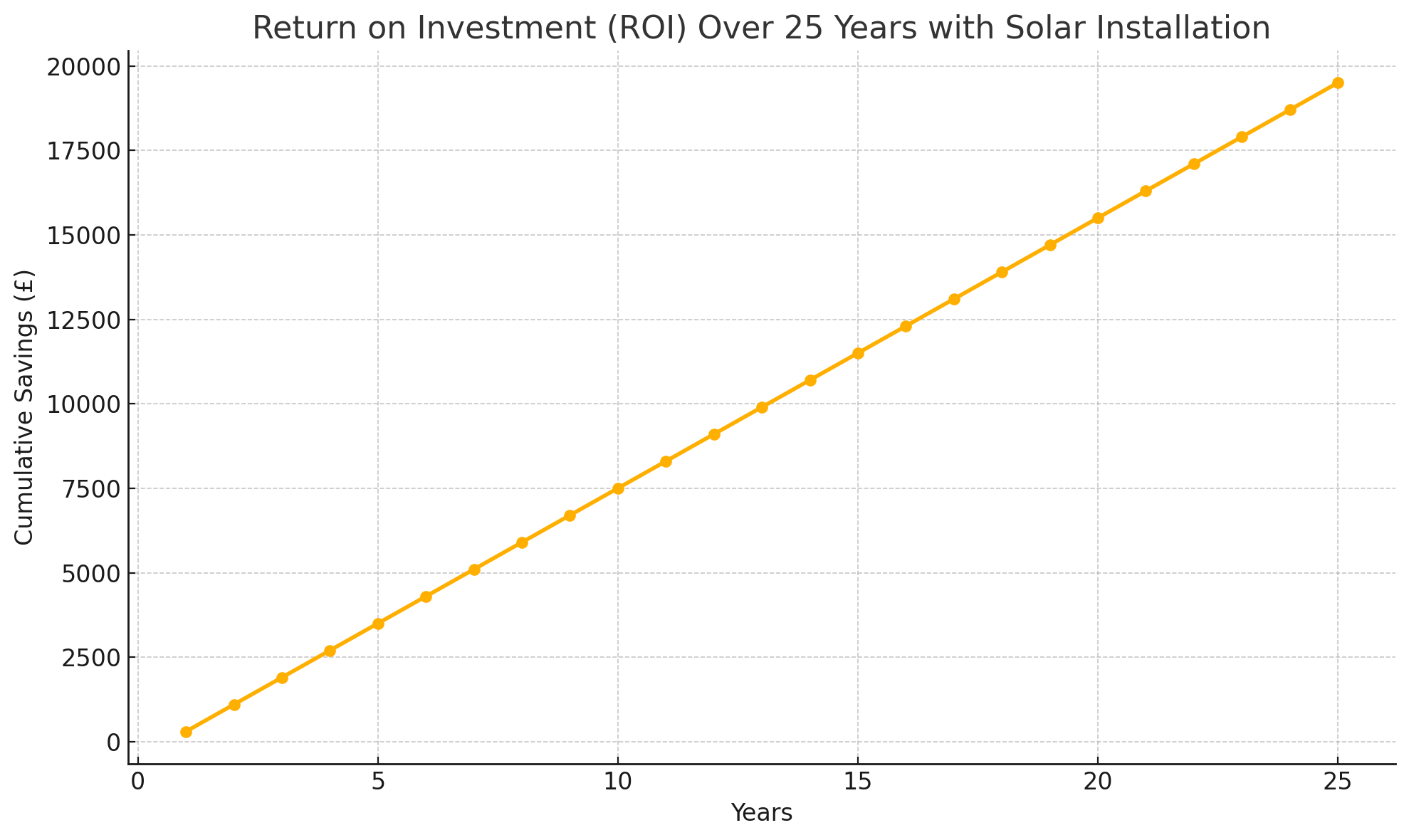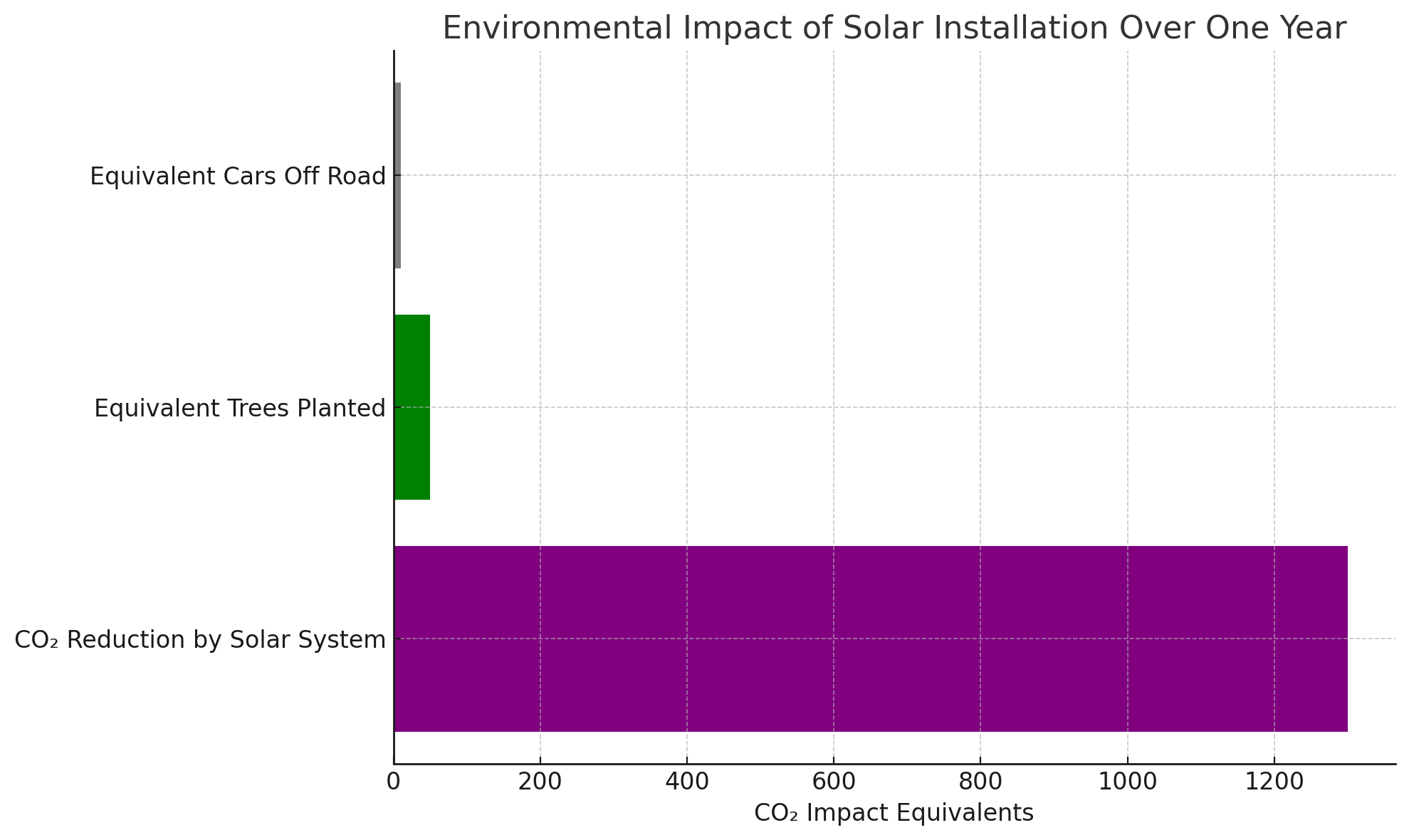Welcome to another brilliant solar panel installation in Cranleigh Gardens, Southbourne, Bournemouth, Dorset, BH6 5LE by Starks Electrical and Solar!
Our latest project demonstrates the effectiveness and precision of a customized solar panel installation. We installed panels on both the east and west elevations of this beautiful slate-roofed home. Why both sides? It’s all about maximizing sunlight exposure throughout the day. With panels on the east side, our system catches the early morning sun as it rises, generating electricity from the start of the day. Then, as the sun moves westward, our west-facing panels kick in, ensuring the system generates power late into the afternoon.
Optimizing Evening Energy Use
One key advantage of this setup is its impact on the homeowner’s evening energy needs. With a fully charged battery system, they can power their home into the night without relying on the grid, even when their electric vehicle needs charging. The installation features our premium brand, Sigenergy. Known for its modular design, Sigenergy offers ease of expansion and comes equipped with heating pads that activate in colder weather to keep battery cells at an optimal temperature. This innovation ensures top-notch performance in any season, protecting against temperature-related efficiency drops and maximizing discharge rates.

The Financial Impact: Significant Cost Savings
Our client was previously spending £138 per month on electricity. With the new system, this has dropped to just £47 per month, thanks to the efficient energy generation and the ability to store energy for later use. Their annual consumption of 5,500 kWh is now offset by 85%, which means they’ll save around £1,087 per year. Imagine the relief of cutting monthly bills by more than half, all while contributing to a greener planet!
Why Choose Starks Electrical and Solar?
Our commitment to quality and customer satisfaction sets us apart. From premium products like Aiko 455 watt panels with partial shading technology, tailored to the UK’s unique climate, to our expert, client-focused installation process, we ensure each system is tailored to maximize long-term benefits.
Thinking About Going Solar?
If you’re tired of rising electric bills and interested in exploring solar options, reach out to Starks Electrical and Solar. We’d love to discuss how a solar system can transform your energy consumption, save you money, and contribute to a sustainable future.
Why Choose Solar in Dorset and Bournemouth?
1. Abundant Coastal Sunlight
Dorset and Bournemouth benefit from a relatively high amount of sunlight compared to other parts of the UK, making solar power a practical and effective choice. This coastal region enjoys over 1,600 hours of sunshine annually, making it one of the sunniest places in the country. For homeowners, this means:
Increased Solar Output:
More sun hours lead to higher electricity generation and faster returns on investment.
Year-Round Energy Production:
While winter months see reduced sunlight, the mild coastal climate still enables panels to generate a steady output across all seasons.
2. Local and Regional Incentives
The UK government and local councils support solar energy adoption through various financial incentives and programs that help offset installation costs and increase energy savings. These include:
Smart Export Guarantee (SEG):
The SEG program allows homeowners to sell unused energy back to the grid, providing an additional revenue stream. Residents in Dorset and Bournemouth can get paid for the extra power their solar panels generate.
VAT Reduction on Solar Installation:
The UK government has introduced a 0% VAT rate on solar panels, which helps to reduce the upfront costs of installation and makes solar more affordable.
Eco-Friendly Property Value Boost:
Homes with renewable energy systems, such as solar, often have a higher market value. In eco-conscious areas like Dorset and Bournemouth, where environmental sustainability is a priority, solar installations can make properties more attractive to buyers.
3. Perfect Conditions for Battery Storage
Battery storage systems are increasingly popular, and the climate in Dorset and Bournemouth is ideal for their use. Batteries allow homeowners to store solar energy generated during the day and use it during the evening or on cloudy days, enhancing the efficiency and financial benefits of a solar system.
Reduced Dependence on the Grid:
Storing energy means homeowners can avoid peak electricity prices and use more of their own power.
Energy Independence:
With battery storage, homes can rely on their own power supply even during power outages or grid issues, an added benefit for areas with increasing energy demands.
4. Supporting Regional Sustainability Goals
Dorset and Bournemouth have strong environmental goals and initiatives aimed at reducing carbon emissions and encouraging renewable energy use. Solar adoption aligns with these objectives, as each installation reduces the demand for fossil-fuel-generated power, contributing to local and national carbon reduction targets.
Lower Carbon Footprint:
For every kilowatt-hour (kWh) of solar power generated, homeowners reduce their CO₂ emissions, helping Dorset and Bournemouth work toward greener energy goals.
Enhanced Community Resilience:
Solar adoption in coastal communities promotes energy resilience, as more residents become energy self-sufficient and reduce the load on the local grid.
5. Financial Savings with Long-Term Impact
In addition to reducing electricity bills, Dorset and Bournemouth homeowners stand to benefit from increasing energy savings as electricity rates continue to rise. With ample sunlight and local support for renewable's, solar users can save thousands of pounds over the lifespan of their system.
Quick Payback Periods:
Solar systems in Dorset and Bournemouth can achieve a payback period of 5 to 10 years, depending on system size and energy usage.
Substantial Annual Savings:
With the ability to offset 70-90% of household energy needs, solar installations can save local homeowners upwards of £1,000 each year.
Why Now is the Perfect Time to Go Solar
For residents in Dorset and Bournemouth, solar energy is a sound investment backed by local sunlight conditions, government incentives, and significant environmental benefits. By choosing solar, homeowners in this region are not only securing long-term financial savings but also supporting a greener, more sustainable future for the community.
Environmental Benefits of Solar Power
Rising Energy Costs Over the Past Decade

– A line graph showing the steady increase in energy costs in the UK, emphasizing the financial incentive for homeowners to consider solar as an alternative.
Before and After Cost Comparison

– A bar chart illustrating the monthly electricity cost reduction for a homeowner after installing solar panels.
Return on Investment Over 25 Years

– A line graph representing the cumulative savings achieved over 25 years, showing how the solar investment pays off significantly over time.
Environmental Impact of Solar Installation

– A bar chart displaying the environmental benefits of a solar system in terms of CO₂ reduction, with equivalents in terms of trees planted and cars taken off the road.
FAQ: Solar Panel Installation
1. How does solar power work?
Solar panels are made up of photovoltaic (PV) cells that convert sunlight into direct current (DC) electricity. An inverter then converts DC into alternating current (AC), which is the type of electricity used in your home. During daylight hours, your panels generate electricity, which can be used to power your home, stored in a battery, or exported back to the grid if you produce more than you consume.
2. Do I need planning permission for solar panels?
In the UK, most residential solar installations are considered "permitted development," meaning they don’t require planning permission. However, if you live in a listed building or a conservation area, there may be additional rules. It’s always best to check with your local council or installer.
3. How much does a solar panel system cost?
The cost of a solar panel system depends on its size, quality, and whether you include battery storage. On average, a residential solar system without a battery can cost between £4,000 and £6,000, while adding a battery may increase the price to between £8,000 and £12,000. The initial investment is offset by savings on energy bills and potential government incentives.
4. What are the benefits of adding battery storage?
Battery storage allows you to store excess energy generated by your solar panels and use it later, reducing dependence on the grid. With a battery, you can use solar power during the evening, save on energy costs, and even have backup power during outages. A battery also allows you to benefit from low-rate tariffs by charging up when electricity is cheaper.
5. How much money will I save with solar panels?
Savings depend on your household’s energy usage, the size of your solar system, and your electricity rate. On average, a well-sized solar system can reduce electricity bills by 70-90%, potentially saving around £800-£1,500 per year. With battery storage, savings can be even higher.
6. How long do solar panels last?
Most solar panels have a lifespan of 25-30 years, but they typically retain a high level of efficiency (about 80-90%) even after 20 years. Good-quality panels often come with warranties covering performance for 25 years, ensuring that they’ll produce power for decades.
7. What maintenance is required for solar panels?
Solar panels require minimal maintenance. Regular cleaning to remove dust and debris, along with an annual inspection, will keep them operating efficiently. Most reputable installers also offer maintenance packages for added peace of mind.
8. Can I add more panels or batteries to my system later?
Yes, many systems are designed to be expandable. Modular battery systems like Sigenergy and EcoFlow allow you to add storage as your energy needs increase. Adding more panels is also possible, though it depends on available roof space and inverter capacity.
9. How does solar power affect my property value?
Homes with solar panels often see an increase in property value. Buyers are increasingly attracted to eco-friendly properties with lower energy bills, and a well-installed solar system can make your home more appealing. Studies suggest solar installations can increase home value by 3-5%.
10. What happens on cloudy days or at night?
Solar panels produce less energy on cloudy days but still generate some electricity. A battery storage system can store excess energy generated during sunny periods to use later. At night, you’ll need to draw power from the grid if your battery is depleted.
11. How does the Smart Export Guarantee (SEG) work?
The Smart Export Guarantee is a government-backed program that allows homeowners to earn money by exporting excess solar energy back to the grid. Under the SEG, energy suppliers offer payments per kilowatt-hour (kWh) of electricity you export, providing an additional revenue stream.
12. What size solar system do I need?
The size of the system you need depends on your household’s energy usage and roof space. A typical UK household requires a 3-4 kW system (10-12 panels), though you may need a larger system if you have high energy usage or plan to charge an electric vehicle.
13. Will I still receive electricity bills?
Yes, but they’ll be significantly lower. You’ll be billed for any electricity you use from the grid, but with a solar system, your reliance on the grid should decrease, resulting in lower overall costs. With a well-sized system and battery, some homes can achieve near energy independence.
14. What happens if I move?
If you move, your solar system stays with the property, which can increase its market value. Potential buyers may be willing to pay more for a home with lower energy costs and a sustainable energy source.
15. Are solar panels environmentally friendly?
Yes! Solar panels produce clean, renewable energy, reducing reliance on fossil fuels and lowering your home’s carbon footprint. Over their lifespan, they can offset thousands of kilograms of CO₂, contributing significantly to environmental sustainability.
16. How long does the installation process take?
From consultation to final setup, a typical residential installation takes 1-2 days. The entire process, including planning, permitting, and installation, usually spans a few weeks, depending on scheduling and regulatory factors.
17. How do I start the process of going solar?
To get started, contact a reputable installer to schedule a consultation. They’ll assess your energy needs, roof condition, and site suitability to provide a tailored recommendation. After you agree on the design and costs, they’ll handle the installation process from start to finish.
If you’re curious about whether solar panels could be the right fit for your home, our team at Starks Electrical and Solar is here to help. Give us a call today to learn more 01425 460419! Our experts will walk you through everything you need to know, from assessing your property’s solar potential to understanding how much you could save on your energy bills. Let’s explore how solar can work for you and your home – reach out to Starks Electrical and Solar today for personalized advice and a brighter, more sustainable future.
- Log in to post comments

